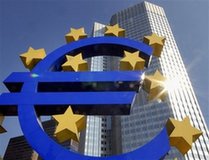2009年1月1日是欧元的10周年纪念日,十年的时间对一种货币来说并不算长,但它却在短短十年里完成了价格稳定、刺激贸易和投资、整合金融市场以及货币统一的使命。而在金融危机不断恶化、改革全球金融体系呼声空前高涨之时,涉世未久的欧元,其不可忽视的价值得到英国官员认可,英国的重量级人物也对最终加入欧元区的想法表现出更为开放的态度。

|

|
|
As the anniversary approaches of the Jan. 1, 1999, arrival of the euro, economists say the new currency is finally fulfilling its promise as a way to lower borrowing costs, ease trade and tourism, boost growth and strengthen the European community.
|
Ten years ago, Europe launched its grand experiment with a shared currency — and watched it plunge in value before recovering.
As the anniversary approaches of the Jan. 1, 1999, arrival of the euro, economists say the new currency is finally fulfilling its promise as a way to lower borrowing costs, ease trade and tourism, boost growth and strengthen the European community.
And doing it amid a global financial crisis that, for the moment, underlines the safety in numbers that comes from joining one, big currency.
"After 10 years it has truly created a zone of security and stability," French Finance Minister Christine Lagarde said in mid-December. "From all these points of view, the euro has in fact proven wrong the forecasts some made against the euro 10 years ago."
When it was launched for non-cash purposes in 1999, just 11 countries were on board — Austria, Belgium, Finland, France, Germany, Ireland, Italy, Luxembourg, the Netherlands, Portugal and Spain. Notes and coins were added on Jan. 1, 2002, and the original 11 have been joined by Cyprus, Greece, Malta and Slovenia, with Slovakia slated to join on Jan. 1, bringing the total to 16. Now, some people in longtime holdouts such as Sweden and even strongly euro-skeptic Britain are beginning to reconsider the question.
Smaller countries such as Iceland, which has stayed out of the EU, and EU member Hungary, which hasn't yet met the requirements to join the euro, have seen their currencies sink in value and been forced to ask the International Monetary Fund for bailouts.
Otmar Issing, a former board member of the European Central Bank, said the euro's appeal has been its ability to provide a sense of stability and shelter from the storm of global crises. The bank, created specifically to oversee the euro, has taken a strong anti-inflationary stance that mirrors that of its chief predecessor, Germany's Bundesbank central bank.
"The euro is a stable currency, inflation expectations were under control right from the start," Issing told The Associated Press.
"Not surprisingly, quite a few observers — with probably the majority of economists to the fore — were more than skeptical as to the outcome of this experiment," he said.
The chief complaints from governments during the euro's first 10 years have arisen from the bank's one-size-fits-all interest rate policy — which can't give rate cuts to individual countries if their economy dips while others rise. But the credit crisis has swept over the global economy due to heavy bank losses on securities backed by U.S. mortgages to people with shaky credit has hit everyone at pretty much same time.
That has helped people forget the euro's early plunge, from around $1.18 at launch to only 82 cents by October 2000. The European Central Bank joined with the Federal Reserve and other central banks in intervening in currency markets to prop it up.
(Agencies)

(英语点津 Helen 编辑)